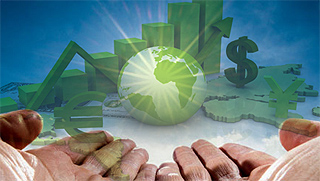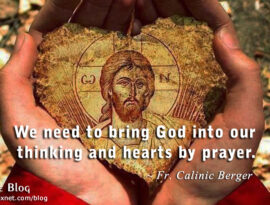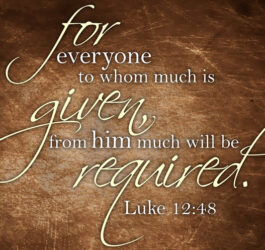 by Chris Banescu –
by Chris Banescu –
Economic truths, like moral truths and other truths discovered through mathematics, biology, physics, and astronomy, are part of God’s dominion. As Orthodox Christians we believe that our Lord is the GOD of all creation, all matter, and all life. Not only did He invent and bring into existence the entire visible and invisible Universe, but He also created the laws that govern matter, energy, and human relations. Economic laws and truths are part of His creation as well and, like everything else in this world, subject to His authority.
Unfortunately, this truth is unknown by many Christians, even though they depend on economic principles to insure their own survival and prosperity, and support their communities and churches. Christians rely on economic laws to feed, clothe, shelter, and protect their families. Through their hard work, efforts, risks, innovations, investments, and sacrifices Christians ultimately support the new value and wealth that churches and governments can then use to feed, clothe, shelter, and help the poor.
Luckily there are Christian authors who are addressing this obvious fact. In his book “Money Greed and God: Why Capitalism is the Solution and Not the Problem,” Jay W. Richards reminds us that “economic truths are truths” and they “don’t stand outside God’s dominion.” Despite the many falsehoods and communist propaganda embraced and spread by the Religious Left, Christian teaching does not contradict ethical free-market economics (capitalism).
Economic truths are truths. But they don’t stand outside God’s dominion. Being a Christian doesn’t mean you can disregard economic facts. But understanding economics doesn’t answer the really tough questions: Does Christian theology have anything to contribute to capitalism? Does capitalism fit with the Christian view of the world? And the big one: Is the capitalist system consistent with Christian morality? If a free-market economy contradicts Christian ethics, Christians can’t be capitalists.
As it turns out, there is no such contradiction. We suspect one only because many of capitalism’s champions and critics miss the subtleties of the capitalist system: to prosper, a market economy needs not just competition, but rule of law and virtues like cooperation, stable families, self-sacrifice, a commitment to delayed gratification, and a willingness to risk based on a future hope. These all fit nicely with the Christian worldview.
…How is wealth created? The economist can’t easily answer this question, but the Christian can. Paradoxically, the key source of material wealth in a modern market economy is immaterial. It’s spiritual. Wealth is created when our creative freedom is allowed to prosper in a free-market environment undergirded by the rule of law and suffused with a rich moral culture. This creative freedom should be no surprise to Christians. We believe that human beings are made in God’s image—the imago dei. Our creative freedom reflects that divine image. This is one of the least appreciated truths of economics.
Thomas Sowell, noted economist, scholar, and conservative author, similarly observed that businesses have done more to reduce poverty via real wealth creation than all the intellectual elites put together. He correctly criticizes the intelligentsia for being mostly ignorant of economic laws and principles.
It would be devastating to the egos of the intelligentsia to realize, much less admit, that businesses have done more to reduce poverty than all the intellectuals put together. Ultimately it is only wealth that can reduce poverty and most of the intelligentsia have no interest whatever in finding out what actions and policies increase the national wealth. ~ Thomas Sowell




